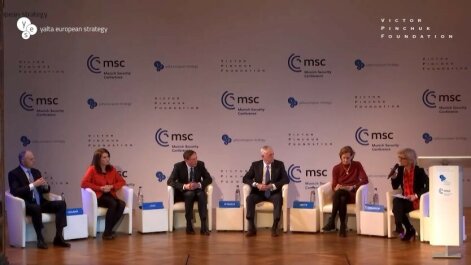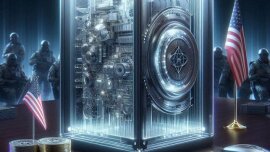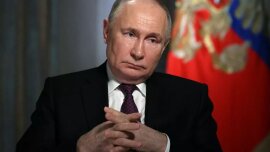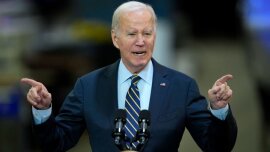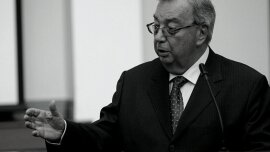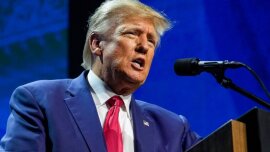Feb. 19 in Munich, Ukraine was discussed not only in connection with Zelensky's speech, but also at the Ukrainian lunch, which is organized annually on the sidelines of the conference by Pinchuk and YES. Unfortunately, Volodymyr Zelenskyy's speech took place after the Ukrainian lunch speakers discussed Ukraine. I think that the discussion would have gone according to a slightly different scenario. We would discuss mainly Zelensky's theses, which made a lot of noise.
But Pinchuk also had something to listen to. Starting with the proposed topic of discussion - "Europe’s security is decided in Ukraine." This is exactly how the question should be posed today. And to wake up relaxed Europeans, as well as Americans, who, both at the Ukrainian lunch and at the entire conference, theorized quite a lot about how united the West is today in the face of the Russian invasion of Ukraine, what sanctions and what stages will need to be introduced, and what will be the point of no return for the West based on Putin's actions.
Anne Applebaum absolutely rightly pointed out that Putin's statements about the inadmissibility of NATO expansion should not be taken seriously. In the current situation, Putin is not so much concerned about this as the very fact of the existence of a successful, sovereign and subject Ukraine. Therefore, no papers with guarantees that Ukraine will not join NATO, whether they come from the Alliance or from Ukraine itself, will not save the situation.
I liked the line led by the moderator of the discussion - Zanny Beddoes from The Economist , which, as soon as the guests left for long reflections on the position of the West, immediately aggravated the discussion, turning to the speakers: “Is there anything at all other than statements about the unity of the West? It's so easy to say all the time that we are one.”
James Mattis said an interesting thing. According to him, the United States is constantly analyzing Russia in terms of its synchronization with China. “We see that Russia is increasingly coordinating its development path with China, including military issues.”
There is no secret in this, but we must remember that the US traditionally plays on many flanks, and one of them is the weakening of China. For the US, Russia does not pose any serious threat or competition, but as a satellite of China, Russia poses a serious threat to the US. Therefore, in the near future, the United States will make every effort to weaken this cooperation, diverting Russia to other areas. And Ukraine, especially weak and divided, is an excellent field for playing with Putin. As well as for Putin - for playing with the West.
It is interesting that when, at the beginning of the discussion, the organizers asked the guests a question about whether there would be a full-scale war? The majority - 67% - believe not.
Then I give a number of key theses that were voiced at Pinchuk's lunch in Munich. They quite eloquently show the thoughts and moods that reign in the heads of the Western elite:
Swedish Foreign Minister Ann Linde
We (the West) are now more united than last autumn.
Mircea Geoană, NATO Deputy Secretary General
The West must be politically united in the current situation.
“Ukraine and Russia are already at war. The war didn't stop. More and more young Ukrainians are dying, in particular from sniper bullets. It's a very long war."
Geoană believes that because of his actions in Ukraine, Putin got the opposite of what he wanted when he began the intervention.
David Petraeus, general, former CIA director
We are on the verge of events that will require us to be completely united.
James Mattis, general, former US Secretary of Defense
Putin is a character from Dostoevsky. Putin believes that there are only enemies and those who obey him.
This correlates very well with Vladimir Pastukhov's excellent text "Dostoevshchina in the Kremlin: from “The Gambler” to “Crime and Punishment”, which I strongly recommend to you.
Mattis, by the way, is confident that Putin can move his army into Ukraine.
Anne Applebaum, historian, expert of the Atlantic Council
The Biden administration's decision to reveal the intelligence was the right one, as it helped fight Russian disinformation.
Applebaum also believes that the West has been very selective in imposing sanctions on Putin's oligarchs. And honestly admitted that there are many tools to get around them.
The Americans have traditionally taken a harder line than the Europeans. James Mattis, believes there should be a snowball effect in "sanctions". And David Petraeus is sure that "Russia can deploy energy weapons." Oh, this American intelligence 😊
Wolfgang Ischinger pointed out "we are really separated by energy." “This is a big problem in German domestic politics. We should try to get out of the clutches of this problem. There is a factor of German voters who may react differently to the inability to have heat in their homes in winter,” he said. "We also have a lot of pro-Russian sentiment here in Germany," Ischinger added. Well, given the kind of cultural work Russia has unfolded in Germany, this is just not surprising.
Then the head of the Ukrainian Foreign Ministry Dmitry Kuleba spoke, who was quite specific and precise in his wording. In particular, he debunked a number of fake statements about Ukrainian shells in Russia. Farther he indicated what the West is expected to do:
- Sanctions. Weapon. Help the economy. Active diplomacy. This is the moment when the desire to wait and see plays into the hands of Russia. As soon as Putin sees any hesitation or lack of unity, this will immediately push him to the next action.
- “What will be the trigger for the imposition of truly devastating sanctions against Russia? It is not necessary to wait for some specific moment»
- So far, no one has punished Russia for the active passportization of citizens in ORDLO. Why is this not a reason for sanctions? One should not expect that some Russian warrior will cross the border with a Russian flag in his hands.
Summary: Ukrainians for the first time in many years spoke very clearly, showed initiative and were not afraid to call a spade a spade.
The West seems to be beginning to realize that Putin is not joking and intends to implement his project of geopolitical reorganization of the world. However, it is still very difficult for Westerners to admit to themselves that they will have to go beyond the cozy structures that they got used to after the collapse of the USSR.
Ukraine no longer has any options, except for conscious and rational actions that are adequate to the situation. The alternative to gaining its own subjectivity in the current historical circumstances is only the final transformation into food on the big table, at which some Western states de facto recognize Lviv as the Ukrainian capital, and Russia is preparing to repeat 2014-2015 for us, followed by access to "Minsk-3".
So now comes the key moment. Glimmers of understanding of this sounded at the "Ukrainian lunch", and at other events in Munich. But we still have a lot of work to do in the coming weeks and months for our agenda to set the tone.
